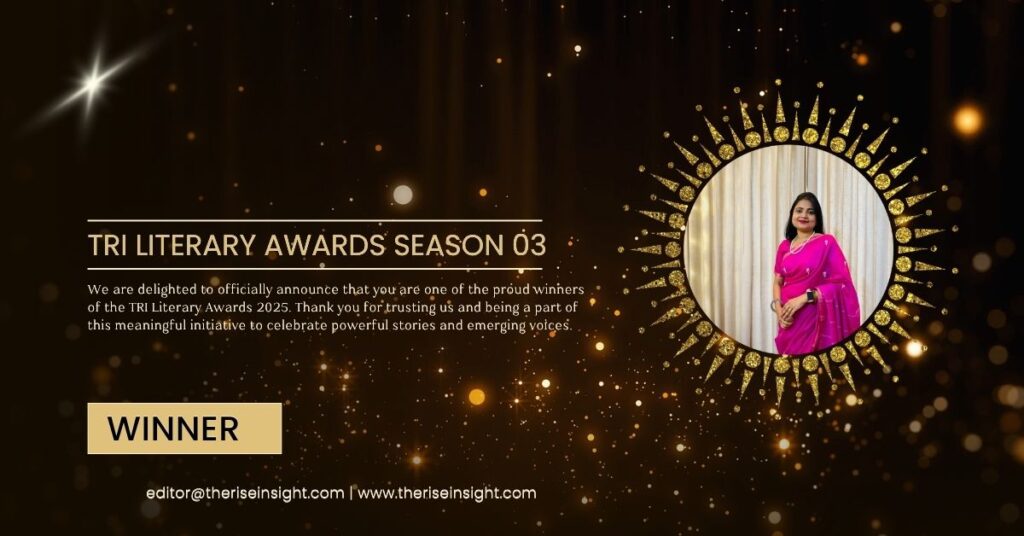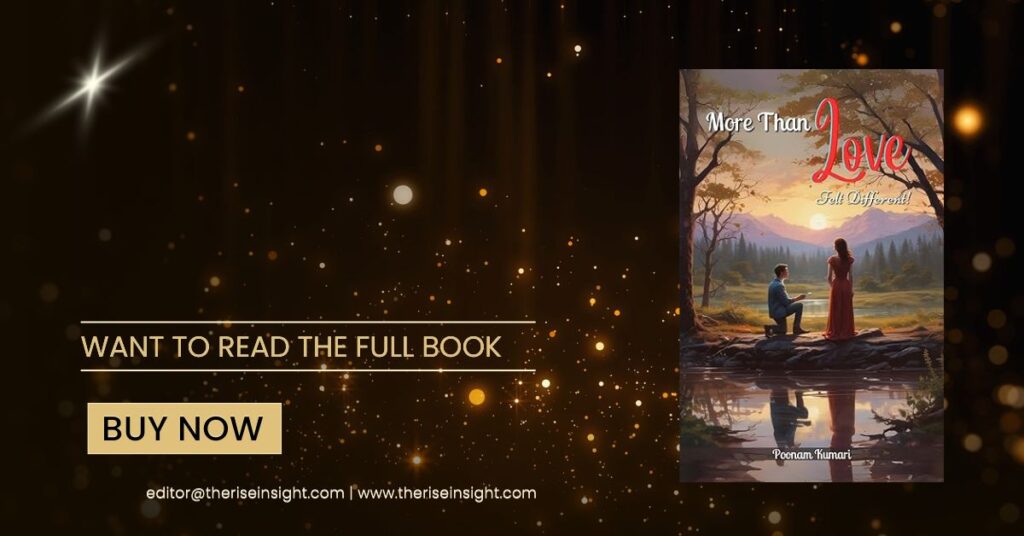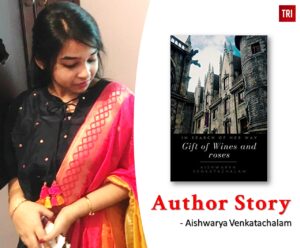
With immense joy and respect, I extend my warmest congratulations to Poonam Kumari for winning the prestigious TRI Literary Awards Season 03 for her beautifully written and emotionally resonant debut novel, More Than Love, Felt Different – A Story of Love, Loss, and Self Discovery. This award is a much-deserved recognition of a voice that is honest, vulnerable, poetic, and deeply aware of the emotional tides that shape a woman’s inner world.
Having read this novel from cover to cover with both admiration and reflection, I can confidently say that Poonam has crafted something far more than a typical love story. She has given us a mirror, a diary, and a companion—a story that reads as though it were written for you, about you, or to you. It is literary in its prose, tender in its emotions, and powerful in its message.
💫 A Journey Through Layers of Love and Self
At the center of this deeply emotional novel is Vishakha, a woman we meet in her thirties, quietly accomplished, fiercely independent, and refreshingly real. Her journey is not one of dramatic plot twists or exaggerated romance, but of subtle emotional awakenings, personal revelations, and the understated beauty of loving, losing, and learning.
What immediately draws readers into the story is how Vishakha’s experiences mirror the lives of so many modern women. She isn’t looking for a fairy tale or a knight in shining armor—she is looking for understanding, connection, and meaning. Through five significant romantic relationships, each beautifully distinct in its tone and lesson, she traverses the peaks and valleys of emotional growth. What’s remarkable is how each love does not merely “pass” through her life, but sculpts her, chiseling away illusions and revealing truths about her strength, her fears, and her capacity for healing.
Poonam does not present love as a singular, linear event. Instead, she dares to propose a radical idea—that love can be plural, and that its purpose may not always be to last forever, but sometimes simply to show us a part of ourselves. This theme is intricately woven throughout the novel, resonating deeply in a society that still upholds the one-love-for-life ideal as a virtue. Vishakha’s five loves are not “failures” or “mistakes”—they are steps in her becoming.

📝 The Writing Style – Poetic, Precise, and Emotionally Intelligent
What sets Poonam Kumari apart as a debut author is her ability to express vulnerability without melodrama. Her prose flows like quiet water—never jarring, never excessive, and yet profoundly impactful. Her background in media and literature is evident in her careful construction of scenes, her command of rhythm in narration, and her delicate treatment of internal monologue.
She writes not just about love, but the silences between words, the moments of hesitation, the second-guessing, the small victories of emotional resilience. Her characters are not stereotypes or plot devices; they are flesh-and-blood humans, full of contradictions, desires, flaws, and hopes. She doesn’t rush their development. Instead, she allows readers to sit with them, to feel them.
There are moments in this book that read like poetry, especially in how Vishakha reflects on each love story in hindsight. One particular relationship, for example, ends not with fireworks or betrayal, but with quiet detachment—the slow realization that something once beautiful has simply run its course. The emotional intelligence required to write such a scene authentically is no small feat, and Kumari handles it with grace and maturity.
🌿 Themes That Stay With You
Apart from love and self-discovery, More Than Love, Felt Different tackles solitude, societal expectations, identity, aging, and healing. There is also a strong thread of female empowerment that runs through the narrative—not in a preachy or overtly politicized manner, but through lived experience. Vishakha’s choices are not always understood by others, but they are always hers, and therein lies her power.
Poonam also subtly explores the idea of emotional endurance—how the heart can break multiple times and still believe again. In an age where vulnerability is often masked by cynicism or self-protection, this message is both refreshing and radical. Vishakha teaches us that it’s not weakness to love repeatedly; it is a courageous act of hope.
The novel’s settings—urban apartments, office spaces, quiet cafés, family homes—are unremarkable in themselves, but they become emotional landscapes in Poonam’s hands. Each space mirrors Vishakha’s inner state: the emptiness of a room, the noise of a crowded office, the stillness of a balcony after a long day. These details ground the novel in realism while adding depth to its emotional layers.
🧠 Psychological and Social Insight
One of the book’s strongest aspects is how it seamlessly blends psychological realism with social commentary. Vishakha is not immune to the pressures of age, career, and societal expectations. As a woman in her late thirties, she reflects on the questions so many women silently grapple with: “Is it too late for me?”, “Do I have the right to want love again?”, “Can I have both independence and intimacy?”
Rather than offering clean answers, the book invites readers to sit with the discomfort of these questions. And in doing so, it provides something far more valuable than resolution—it offers recognition. You see yourself in Vishakha, not because she’s perfect, but because she is real.
📚 A Powerful Debut with a Promising Future
As a reviewer and reader, I can confidently say that More Than Love, Felt Different is not only a powerful literary debut, but a necessary contribution to contemporary Indian women’s literature. Poonam Kumari’s voice is one that is needed—authentic, reflective, and unafraid to explore the emotional gray areas that so many novels shy away from.
This book is especially relevant in a time when conversations around emotional intelligence, self-awareness, and adult relationships are gaining prominence. It belongs on the shelves of every reader who has ever loved, lost, questioned, and grown. And for women, especially those navigating their own identities beyond societal timelines, this book feels like both a hug and a mirror.
Here is heartfelt feedback from each of the nine reviewers after reading More Than Love, Felt Different – A Story of Love, Loss, and Self Discovery by Poonam Kumari:
1. Prashant Sahu:
“Reading More Than Love, Felt Different felt like listening to the inner voice of every modern woman who has quietly endured, learned, and grown. Vishakha’s journey was not just her own—it resonated with every unspoken emotion I’ve seen in those around me. Poonam’s writing is so reflective that it feels like she’s speaking directly to the soul.”
2. Sameer Gudhate:
“This is not just a story about love—it’s a philosophical and emotional map of how we evolve through relationships. Poonam Kumari has given us a deep and human portrayal of the cycles of love, heartbreak, and healing. Vishakha’s character is real, raw, and unapologetically herself, which makes the book both gripping and therapeutic.”
3. Apeksha Gupta:
“I was moved by the honesty in Poonam’s storytelling. The idea that love can happen more than once, and that each time it teaches us something new, is beautifully portrayed. As a woman, I found strength and solace in Vishakha’s story. It’s the kind of book that stays with you long after it ends.”
4. Akansha Sinha:
“Each chapter of this book felt like a chapter from my own life. Poonam’s portrayal of emotions is so genuine, it’s almost poetic. Vishakha’s quiet strength, her vulnerability, and her courage to love again and again deeply inspired me. A must-read for every woman who has ever felt unseen.”
5. Glenville Asbhy:
“The narrative is deeply human. Poonam Kumari writes with clarity and emotional intelligence that transcends gender or cultural boundaries. It’s a story about rediscovery, written with empathy and elegance. Vishakha’s journey proves that love in its many forms is not a weakness, but a path to wisdom.”
6. Pooja Sahu:
“As someone who believes in the power of second chances, this book truly touched my heart. Poonam’s storytelling is lyrical and relatable. I saw parts of my past, my doubts, and my growth in Vishakha’s character. It reminded me that no love is ever wasted if it teaches you something.”
7. Versha Singh:
“This book was like a mirror—I saw my past, my heartbreaks, and my healing in it. Poonam Kumari has beautifully articulated emotions that we often struggle to name. The strength of Vishakha lies in her imperfections, and that makes her unforgettable. A beautiful ode to emotional resilience.”
8. Shivangi Yadav:
“More Than Love, Felt Different is more than a love story—it’s an anthem of self-worth. The way Poonam blends introspection with storytelling is powerful. She doesn’t glorify pain but gives it meaning, and that’s what makes Vishakha’s journey so inspiring. I felt understood, seen, and empowered.”
9. Kavita Kaushik:
“This book made me cry, smile, and reflect. It’s honest in a way few novels dare to be. Poonam’s writing captures the beauty of emotional messiness, of imperfect people navigating life with hope. Vishakha is all of us at different stages of life, and this story feels like a warm hand holding yours.”
✨ Final Thoughts
Poonam Kumari’s More Than Love, Felt Different is a book that lingers—not because of plot twists, but because of truth. It tells us that it’s okay to change, to love differently each time, and to keep rediscovering who we are. Her triumph at the TRI Literary Awards is not just a personal milestone—it’s a celebration for every reader who has dared to believe in love more than once.
Congratulations once again, Poonam Kumari. This is just the beginning of a luminous literary journey.
Your words have found their way into countless hearts—and they will stay there.





